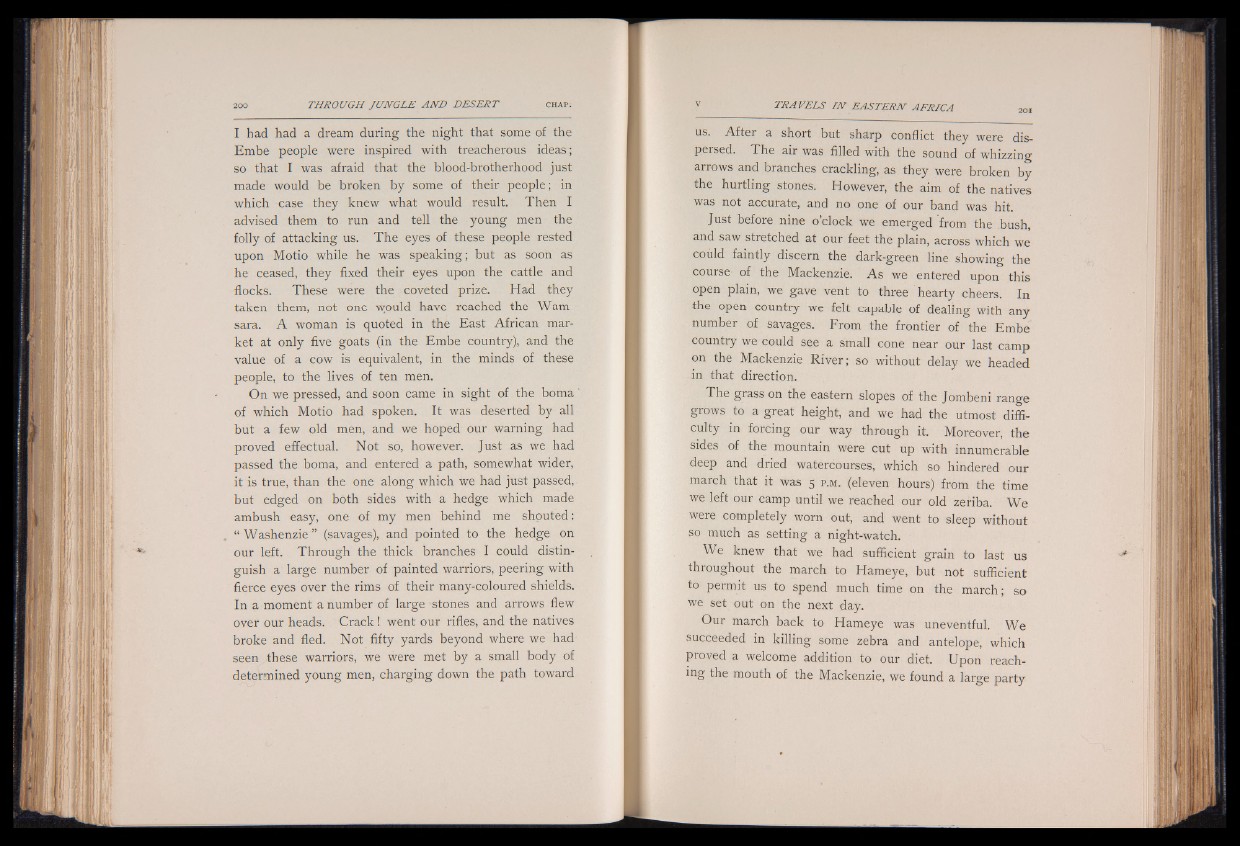
I had had a dream during the night that some of the
Embe people were inspired with treacherous ideas;
so that I was afraid that the blood-brotherhood just
made would be broken by some of their people; in
which case they knew what would result. Then I
advised them to run and tell the young men the
folly of attacking us. The eyes of these people rested
upon Motio while he was speaking; but as soon as
he ceased, they fixed their eyes upon the cattle and
flocks. These were the coveted prize. Had they
taken them, not one would have reached the Wam-
sara. A woman is quoted in the East African market
at only five goats (in the Embe country), and the
value of a cow is equivalent, in the minds of these
people, to the lives of ten men.
On we pressed, and soon came in sight of the boma
of which Motio had spoken. It was deserted by all
but a few old men, and we hoped our warning had
proved effectual. Not so, however. Just as we had
passed the boma, and entered a path, somewhat wider,
it is true, than the one along which we had just passed,
but edged on both sides with a hedge which made
ambush easy, one of my men behind me shouted:
“ Washenzie ” (savages), and pointed to the hedge on
our left. Through the thick branches I could distinguish
a large number of painted warriors, peering with
fierce eyes over the rims of their many-coloured shields.
In a moment a number of large stones and arrows flew
over our heads. Crack! went our rifles, and the natives
broke and fled. Not fifty yards beyond where we had
seen these warriors, we were met by a small body of
determined young men, charging down the path toward
us. After a short but sharp conflict they were dispersed.
The air was filled with the sound of whizzing
arrows and branches crackling, as they were broken by
the hurtling stones. However, the aim of the natives
was not accurate, and no one of our band was hit.
Just before nine o’clock we emerged from the bush,
and saw stretched at our feet the plain, across which we
could faintly discern the dark-green line showing the
course of the Mackenzie. As we entered upon this
open plain, we gave vent to three hearty cheers. In
the open country we felt capable of dealing with any
number of savages. From the frontier of the Embe
country we could see a small cone near our last camp
on the Mackenzie River; so without delay we headed
in that direction.
The grass on the eastern slopes of the Jombeni range
grows to a great height, and we had the utmost difficulty
in forcing our way through it. Moreover, the
sides of the mountain were cut up with innumerable
deep and dried watercourses, which so hindered our
march that it was 5 p .m . (eleven hours) from the time
we left our camp until we reached our old zeriba. We
were completely worn out, and went to sleep without
so much as setting a night-watch.
We knew that we had sufficient grain to last us
throughout the march to Hameye, but not sufficient
to permit us to spend much time on the march; so
we set out on the next day.
Our march back to Hameye was uneventful. We
succeeded in killing some zebra and antelope, which
proved a welcome addition to our diet. Upon reaching
the mouth of the Mackenzie, we found a large party